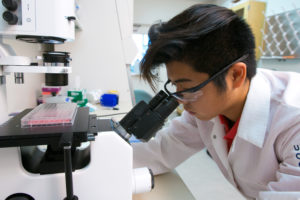
Jason Own, a senior at Benicia High School, participated in the Young Scholars Program at the University of California, Davis. (Courtesy photo)
How did you spend your summer? Did you go to the pool? Did you go on a trip? Did you spend some much-needed relaxation around the house?
You probably did any combination of the above plus some additional summer activities, but you probably did not spend your summer doing research at UC Davis’ School of Veterinary Medicine. However, Benicia High School senior Jason Own certainly did.
This summer, UC Davis put on its Young Scholars Program where academically inclined sophomores and juniors take part in research in the fields of biological and natural sciences. The program is more than 50 years old and only accepts up to 40 advanced high schoolers. This year, Own was among them.
Own has had an interest in the medical field since a he was child, when he frequently visited hospitals as he was afflicted with iron deficiency anemia. Despite being a very difficult experience, Own took away from it a love of medicine.
“During my time at the hospital, I was enamored by the presence of doctors,” he said. “I was astounded by their ability to instill hope among their patients even through such arduous times. I yearned to be in that position, where every day of my life would be dedicated to making another human being smile.”
Additionally, Own’s father works in the medical field and this— coupled with a passion for environmental sciences, nanoparticles and cell biology— only furthered his desire to become a doctor.
Prior to the summer, Own applied to several research programs and was accepted to many of them. He settled on the Young Researchers Program after his Advanced Placement Chemistry teacher Vreni Huebner told him that her son had a great experience from it.
As part of the application, Own had to write a personal essay on what he wished to accomplish after high school. He chose to talk about how his family’s heritage inspired his goal to fuel a career in humanitarian medicine, which itself was inspired by a visit to his parents’ home country of Myanmar in the fourth grade.
“On this excursion, I was exposed to the harsh living conditions of underprivileged countries,” Own said. “I witnessed streets teeming with ailing crowds. I remember that there was this pit in my stomach; a feeling that I could never forget. From that day on, I swore that I never wanted to feel like that again, helpless. I wrote about how my lifelong goal is to eventually return to Burma and set up a pop-up hospital, providing a glimpse of hope for those living in that torn landscape.”
As part of the six-week program, Own was teamed with graduate student Amy Ehrlich and worked in Dr. Helen Raybould’s laboratory to study the signaling between the gastrointestinal tract and the brain and how microorganisms living in the intestines can make changes to this pathway. Own tested the impacts of metabolites produced by intestinal microbiota to see what could reduce the adipose tissue’s inflammatory response in an effort to eliminate or reduce the severity of diet-induced obesity, which has been linked to inflammation in fat tissue cells that form as a result of infections. Own then had to write a research paper and prepare a presentation.
One of Own’s favorite aspects of the experience was working with Ehrlich, who he describes as “an amazing and talented individual.”
“She was very patient in teaching me all that I needed to know,” he said. “She allowed me to access her brilliant mind whenever I was stuck and needed guidance. Most importantly, she treated me as an equal, ensuring that I received an authentic lab experience.”
Own learned from the experience the need to bring likeminded individuals together.
“I was placed in a competitive environment filled with 41 of the best and brightest high school students, who are all hoping to become impactful scientists,” he said. “I met students who I could only wish I’d ever be as intelligent as. However, from these six weeks, I learned that if I wanted to be successful, I would have to rely on personal qualities that separate me apart from all other peers. Instead of competing against others, I have to be the glue, bringing these individuals together and seeking a shared vision.”
After graduation, Own plans to attend a four-year research university and while the field is wide open, he is definitely considering UC Davis as a possibility after visiting it. Moreover, he encourages upcoming scientifically inclined juniors and seniors to apply to the Young Scholars Program next summer.
“This program has truly changed my life, and I cannot stress how amazing of an opportunity it was,” he said. “How many high school juniors/seniors can say that they got to conduct impactful scientific research?”
Applications for next year will open on Dec. 1 and will be accepted through March 16, 2018. To qualify for the program, students need to have high GPAs, recommendations from teachers, and have taken biology and two years of college preparatory math. For more information, go to https://ysp.ucdavis.edu.






Leave a Reply